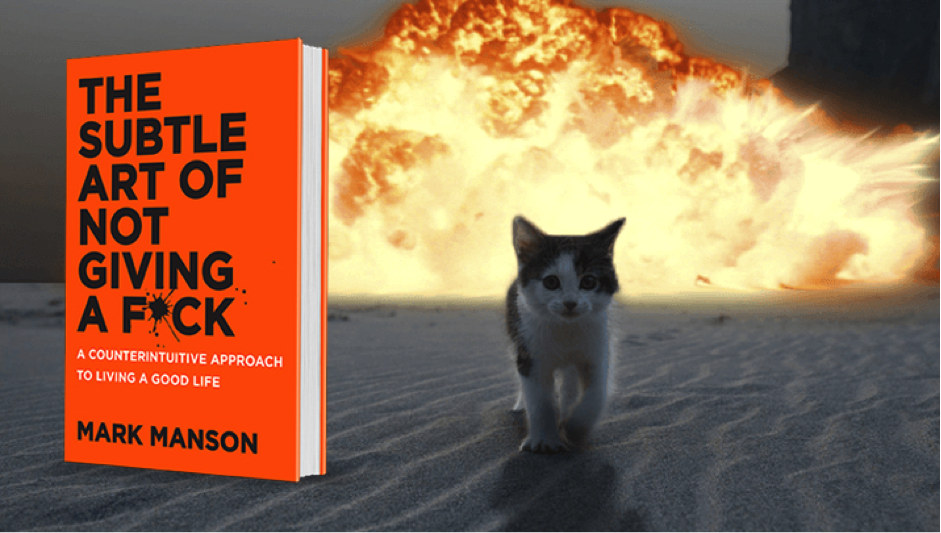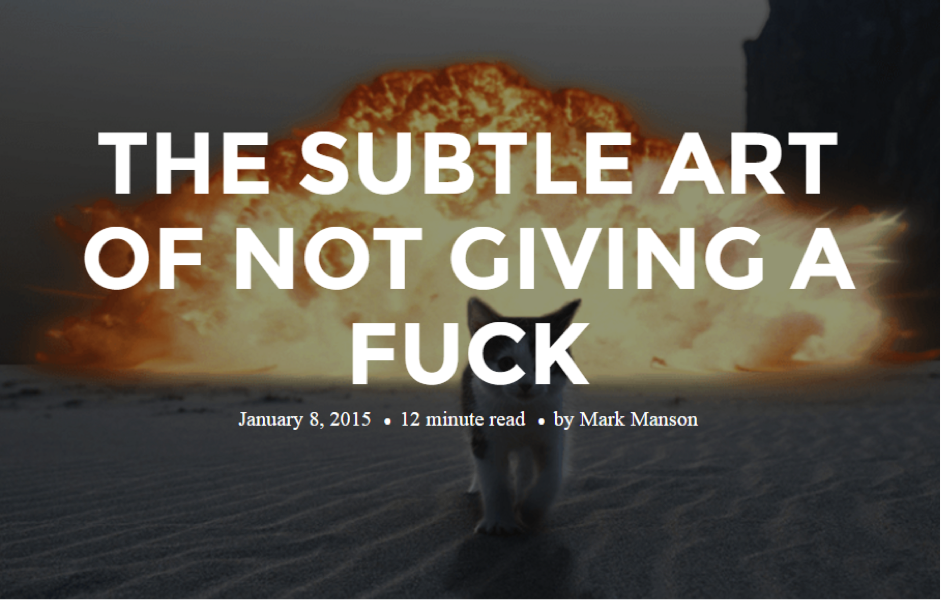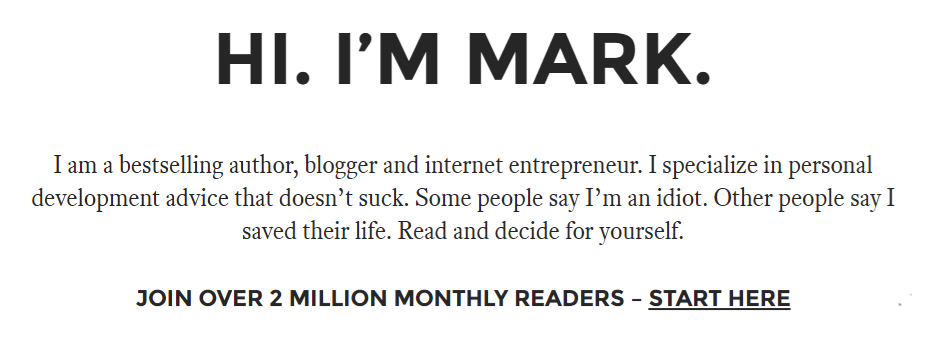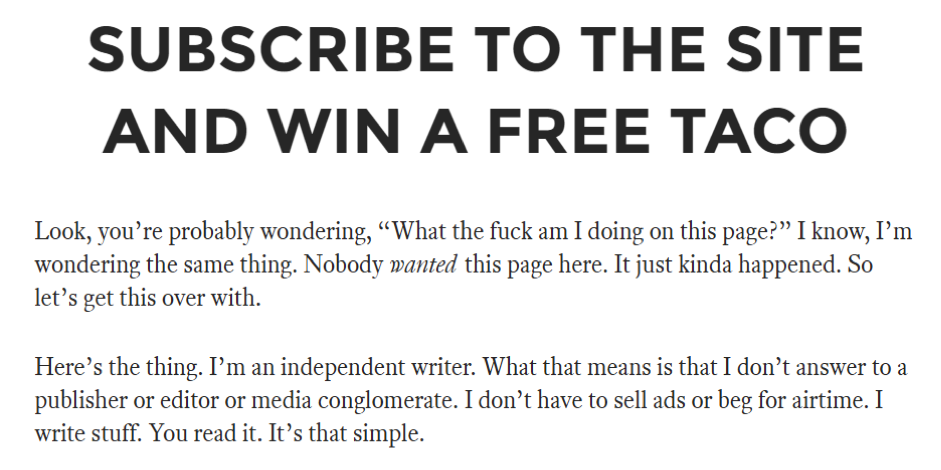ProBlogger: The Subtle art of Successful Blogging – an interview with NYT Bestseller Mark Manson | |
| The Subtle art of Successful Blogging – an interview with NYT Bestseller Mark Manson Posted: 07 Nov 2016 05:00 AM PST Mark Manson is arguably one of the hottest bloggers in the world right now. Over two million people visit his self-improvement blog each month and his new book The Subtle Art of Not Giving a F*ck: A Counterintuitive Approach to Living a Good Life has gone off in a big way, recently hitting The New York Times bestseller list. Mark started blogging in 2008 in the dating space, before pivoting to personal development in 2011. He attributes most of his success to the fact that he is very seriously dedicated to the craft of writing. In this interview Kelly Exeter chats with him about his writing process, monetising his two million monthly readers, and why vulnerability in blogging is over-rated. ————— KE: First things first. My current obsession with the show Suits obliges me to slip a gratuitous reference in wherever I can at the moment. So, tell me – do you watch Suits and has anyone ever said you remind them of Harvey Specter? MM: Hah, never seen it. And though I’ve heard the name Harvey Specter before, can’t say anyone has told me I remind them of him.  Seriously? They're basically the same person KE: Ok, now we’ve gotten that out of the way … Your most recent post, The American Dream is Killing Us, took six months to write. It’s a long, well-researched, highly-considered piece about where the USA is today and how it got there. How do you build out a piece like this? Do you start with a base premise in mind – or does that emerge? And most importantly – you nailed the ending. How hard was that to get right? MM: I always start with a base premise. That’s true for any article, but especially for a piece this long and complex. You need to have a strong overarching argument in mind going into it, otherwise you’ll just get lost in the brush and forget what you’re writing about after a couple thousand words. With the American Dream piece, I knew the overall point I wanted to make from the very beginning. It took a couple throwaway drafts to get the message right (the ‘lemonade stand’ metaphor), and from there it was just a matter of assembling a lot of the history and data into the right spots to back up the main argument. Then you have the ending — which, thank you, by the way, I’m thrilled you loved it, as it was a huge struggle — which took another 2-3 rewrites to nail by itself. I should note here though, so people don’t get super impressed or anything: I wasn’t writing the entire six months. It was a couple weeks in the beginning, then me taking a big break from the piece because it burnt me out and I had a book coming out, then coming back to it and spending another week or two to finish it up. But yeah, it is definitely one of the most difficult articles I’ve ever written. Many of my articles get written in a single afternoon. Most others in a couple days at most. This one seemed to drag out forever. KE: How does one go from penning a dating blog to writing pieces like The American Dream is Killing Us and An Open Letter To Brazil. What does that journey look like? MM: Before I started my dating advice blog back in 2008, I had been arguing about politics and culture and music and technology on internet forums for years. That’s really where I developed as a writer, actually. I was that obnoxious internet forum guy who would spend entire afternoons writing three-page replies to people explaining, in detail, why they were wrong about something. I know: 'What a dick.' The point is, these kinds of topics and ideas pre-date my business by quite a bit. You could say they were actually my original passion. My business started out in 2008 specifically being about dating advice and after working on it for a couple years, it was clear that the only thing that distinguished me from other people in the niche was my writing. So, when I focused on that [the writing], the business became fairly successful as a result. But dating advice gets kind of boring. I mean, there are only so many ways you can tell people not to text creepy things. You can only give people three hot first date ideas so many times before you want to stick a frisbee in your mouth and commit seppuku. So, after a few years, the business began to feel stale. I think the way I was able to successfully pivot out of dating is that ultimately, what made me stand out in the dating advice niche wasn’t simply good advice, it was that I looked at common dating/relationship problems in ways people hadn’t considered before, and in ways that were illuminating and simplified the struggles they were going through. Put bluntly: they liked how my brain worked, and so when that same brain applied itself to culture or travel or happiness, they gladly stuck with it. The post that give rise to his bestselling book. KE: I once heard you say you judge the strength of a piece, not on pageviews/shares, but on whether it moves people to email you. By this standard, what’s been your ‘strongest’ post and why do you think it connected so strongly with people? MM: I look at and consider everything — traditional analytics like pageviews, bounce rate, shares, etc. — as well as qualitative feedback: how many emails I get about a piece, how positive/negative the comments are, how long people still email me about an article after it’s published, even how many people mention an article to me when they meet me in person. When you put all these things together, you get a really interesting perspective on your content. Some articles perform fantastically in terms of analytics, but they fizzle out quickly and don’t have a lasting impact on the site. Other articles perform poorly in terms of traffic and shares, but I’ll get a steady stream of emails telling me how much they loved the article and how important it was for them. When I look at my archive, I want every article to have some sort of value for the site and business. Some articles are much better at grabbing people’s attention and maybe getting them to stick around for a bit. Other articles aren’t as glamorous but they seem to have a really deep impact on people. Other articles are useful for very specific topics like how to handle long-distance relationships or how to get better at writing. These aren’t going to appeal to everyone, but they’re going to have an extremely high amount of value for a minority of readers. Ultimately, I see my entire archive as one collective work. And every article should be adding something useful or interesting to it. If an article isn’t, I will often remove it from the site. KE: You’ve been blogging for nearly 10 years now. What’s easier now than it was 10 years ago (for bloggers)? And what’s harder? MM: It’s easier to start now, mainly because the tools are so much better. Pretty much anybody can open up an account at Medium, write something, post it on Facebook, and within a day have a couple dozen people reading their ideas. Back in the day, not only were things more difficult technologically, but getting those first few dozen readers (not counting your friends and family) felt almost impossible. I think I blogged for a year before I ever had more than 100 people come to my site. What’s harder these days is that the internet is much more crowded and there’s almost too much information out there. So, while it’s easier to get your work in front of people, it’s also that much harder to make a meaningful impact on them and hold their attention. KE: Your development as a writer and blogger over the past 10 or so years has been very iterative and organic. Do you feel people entering the blogging sphere these days are in too much of a hurry to achieve ‘success’ and forget that it takes time to develop their craft? MM: I feel like a lot of people start blogging because they want to start an internet business, but they have no idea what they want to do or sell, so they figure they’ll just start writing and see what happens. On the one hand, that’s better than doing nothing. Blogging is a good way to test out ideas and see if they’re sticking. But the truth is, a blog requires years of work to get to the place where you can even consider making money. As a business plan, blogs kind of suck. You need a great brand and great ideas and be a great writer, all at once, and then you have to do it for at least a year non-stop, and then, maybe, you can start making some money off of it. It’s not going to be practical for the vast majority of people. It’s for this reason that I always advise people that if they’re going to start a blog, it should either a) be because they love writing about something so much, they can’t help but do it anyway, or b) the blog should be supporting some other internet venture they’re starting. There needs to either be passion or purpose there, otherwise past the honeymoon of the first six months or so writing, there will be nothing to keep you excited about blogging. KE: Your writing philosophy is ‘be so good they can’t ignore you’. Have you always taken this view? Or was it a mental shift you made somewhere along the way? And what exactly do you do to ‘be so good they can’t ignore you’? MM: I’ve never been one to half-ass anything. Whenever I get into something, I get obsessive about it and want to be the best I can possibly be. That’s always just been an aspect of my personality, and also a part of my personal ethic: if you’re going to do something, strive for excellence in it, no matter what. As the famous MLK quote goes: if you’re a street-sweeper, sweep the streets the same way Shakespeare wrote poems or Picasso painted. On top of that, let’s be honest, a large percentage of the content on the internet is absolute garbage — lots of lazy copy/paste jobs and scammy marketing. In that sense, developing your own writing ability is practical to differentiate yourself and your content. If you and three other bloggers are saying the same thing, then people will gravitate to whoever says it best, whoever can communicate with the most power and clarity. This is incredibly valuable in the long-run. As for how I got good at writing: I think I just took it very seriously much earlier than most bloggers. Back around 2010, when I decided to get serious about my blog, I went out and bought half a dozen books about writing and how to improve at it. I started reading famous non-fiction writers such as David Foster Wallace, Joan Didion and Hunter S. Thompson. I started reading literature by greats like Hemingway and Tolstoy. I started dabbling in fiction and poetry in my spare time. On the blog itself, I began to experiment with different forms and styles, longer posts about a wider variety of subjects, and became much better at editing — as that’s 90% of what good writing really is: good editing. KE: With great power (i.e. over 2 million readers a month) comes great responsibility. How seriously do you take this responsibility/how does it sit with you? MM: I try to make it clear as often as I can to my readers that I don’t have all the answers. I reject the “guru” model of self-help — where someone stands on stage with all the answers. I write most of what I write not because I have all the answers, but rather because I’m struggling (or have struggled) with the same questions as my readers. In that sense, I see my writing as a very public form of therapy. The 'cover blurb' on Mark's home page. KE: The sub-title of your blog is ‘Personal Development That Doesn’t Suck’. And that’s a pretty accurate summary of what you write about. I've always wondered if the fact you’re not a psychologist allow you to say things about self-improvement you wouldn’t be able to if you were a psychologist? And whether you consciously leverage this? MM: Not really. My language may be more colourful, but the underlying principles are the same. A lot of psychologists have told me that they recommend my articles to their clients — which always makes me feel good. KE: You have two guys working for you who have their Masters in Psychology. Do they ever pull you up and say ‘Hey Mark, you can’t say that’ or ‘it would be irresponsible to say that’? How much influence do they have over what does and doesn’t get published. MM: They occasionally keep me in check and make sure I don’t say something that’s out of line. But at this point, I’ve done so much research over the past five years that their value is less in teaching me things about the subject and more in helping me understand specific research or data I come across. They’re trained to read research in a way that I’m not. KE: Vulnerability is the tool bloggers tend to use to create a connection with their readers, yet there is a real absence of personal vulnerability in your writing. Is that a conscious choice? How do you create connection in its absence? MM: I actually think most bloggers, especially when they’re starting out, have a tendency to write about themselves too much. Don’t get me wrong, I think it’s important to be open and transparent with your readership. But ultimately, if you’re sharing something from your own life, that story should be driving some larger point that is going to be relevant to your readers’ lives. I’ve learned over the years that people respond much better when you talk about their problems directly, rather than hinting at them through your own experiences. My own experiences are nice, and sometimes I share them when they’re relevant (my book has a lot more personal stuff than my blog), but if I can get a point across without inserting myself into it all the time, I find it more effective to do it that way. KE: As mentioned previously, you have over 2 million people reading your blog every month. How do you monetise that readership? MM: Two books (one self-published, one traditionally published), online courses, and I’m experimenting with a subscription model where people can get access to extra content for a small monthly fee. That’s still a work-in-progress, but it’s going well so far. Mark's unique, on-brand call to subscribe KE: You’ve said the main reason you went with a publisher for The Subtle Art of Not Giving a F*ck was because you felt that would introduce your work to readers you wouldn’t ordinarily be able to access. Has this panned out? MM: It definitely has. I’ve been on the radio and in a number of newspapers, hit the NYTimes bestseller list, and promoted in hundreds of book stores around the country. I’ve sold way more copies of the book than I ever would solely through my email list. So, I’m very happy with the decision. KE: What’s next for Mark Manson? More pieces like The American Dream is Killing Us? Next book? MM: I will start writing another book early next year. That one will likely come out in 2018. As for the blog, every time I finish a book, I find myself feeling the need to stretch out and dabble in other topics. That’s why there have been a number of posts this year about culture, politics and technology. Some of them have been better-received than others. So, we’ll see how it goes. But with my writing, I aim to always be moving ahead, always experimenting and exploring. A repetitive blog is a dead blog. —– Kelly Exeter is a writer, editor, and designer who's endlessly fascinated by the power of the stories we tell ourselves. She explores these on her blog and in her books Practical Perfection and Your Best Year Ever. Connect with her on Facebook, Twitter, and Instagram. The post The Subtle art of Successful Blogging – an interview with NYT Bestseller Mark Manson appeared first on ProBlogger. |
| You are subscribed to email updates from ProBlogger. To stop receiving these emails, you may unsubscribe now. | Email delivery powered by Google |
| Google Inc., 1600 Amphitheatre Parkway, Mountain View, CA 94043, United States | |







0 comments:
Post a Comment